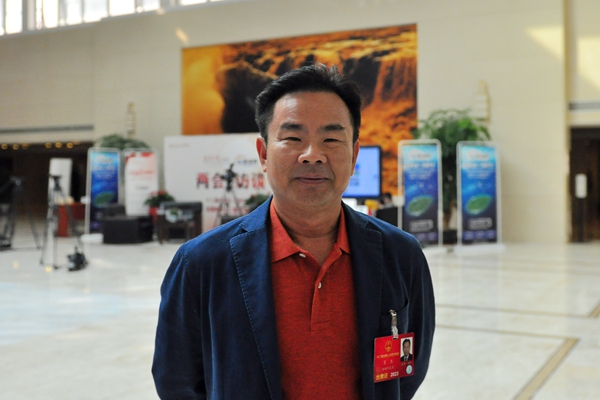Sansha forges ahead with blue economy: mayor
- By Guo Yiming
 0 Comment(s)
0 Comment(s) Print
Print E-mail China.org.cn, March 7, 2016
E-mail China.org.cn, March 7, 2016
The city of Sansha will further expand its blue economy by developing a wide variety of maritime industries drawing on its uniqueness, said Mayor Xiao Jie, a deputy to the National People's Congress (NPC) from China's southernmost city, during an exclusive interview with China.org.cn Sunday.
 |
|
Xiao Jie, a deputy to the National People's Congress (NPC) and mayor of Sansha, China's newest and southernmost city on the South China Sea. [Photo by Guo Yiming/China.org.cn] |
Blue economy, included in both Premier Li Keqiang's annual government work report last Saturday and the 13th Five-Year Plan, will be the focus for Sansha to promote tourism, modern fishery and eco-friendly industries, the mayor told a reporter on the sidelines of the annual sessions of its top legislature and political advisory body in Beijing.
As China's newest city, Sansha was established in July in 2012 to administer more than 200 islets, sandbanks and reefs in the Xisha, Zhongsha and Nansha island groups and two million square kilometers of surrounding waters.
Although the smallest prefecture-level city in both population and land area, it is the largest when including the sea, something that, in Xiao's words, heralds a big strategic opportunity.
"Blue" economy for "green" development
According to the government work report released at the NPC opening ceremony, China will work out a national maritime strategy, protect marine ecosystems and habitats, and open up more space for the blue economy so as to strengthen China's maritime development.
For Sansha, tourism has been a pioneering sector in promoting the city's maritime strategy. The mayor noted rapid development of the sector since Sansha opened up to cruise tours two years ago, and the city is busy expanding the business through creating more travel routes and cruises, as well as providing tourism-based products and souvenirs.
"Besides on-board sightseeing, we will explore more entertainment activities and diverse traveling experience for cruise-goers under sophisticated conditions," said Xiao, adding that tourism is both beneficial to people's well-being and ecological conservation.
Xiao also pointed out possibilities of developing modern fisheries, biomedicine and value-added manufacturing and foreign trade in the islands as essentials in industrial restructuring and ecological conservation for a blue economy.
Recognizing the importance of green development, he said the city has enhanced its afforestation efforts and has built garbage and sewage treatment plants to protect the natural habitat.
Local authorities are also trying to improve infrastructure at its jurisdiction as a number of projects have also been launched to improve living conditions on Yongxing Island, where the city government is located, and its neighboring islets.
Xiao said fresh water and food supply is no longer a problem in the island, and supermarkets and hospitals are also set up for local residents' daily convenience, which has created possibilities for an orderly expansion of its tourism capacity.
The city is expected to launch civil flight services and enjoy full WIFI coverage in 2016, according to the government work report delivered earlier to the local legislature.
"With its improved and ever-improving infrastructure, Sansha will contribute much more to China's initiative of building the 21st Century Maritime Silk Road," the mayor said.
Sansha plays an important role in strengthening China's sovereignty and maritime rights over the islands in South China Sea, he added.






Go to Forum >>0 Comment(s)